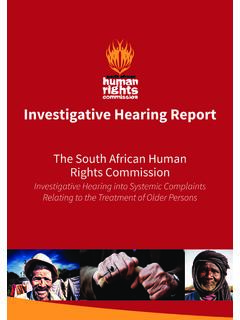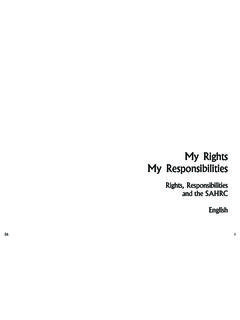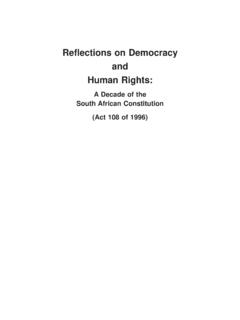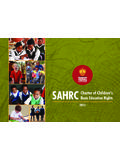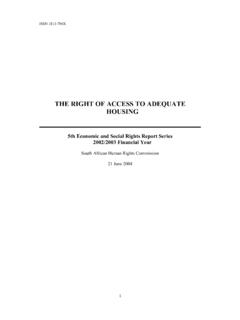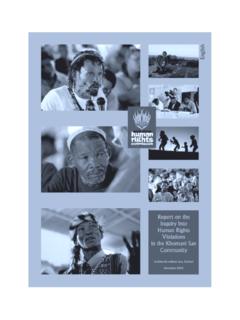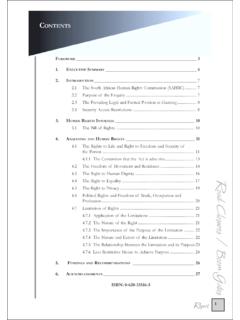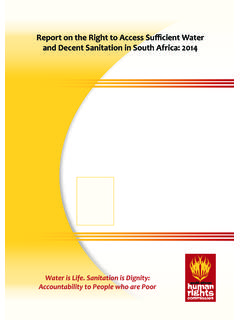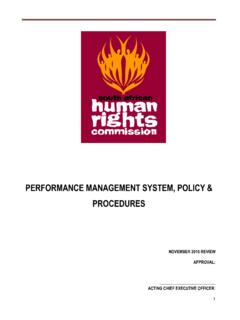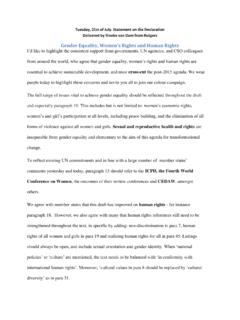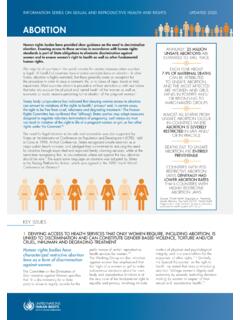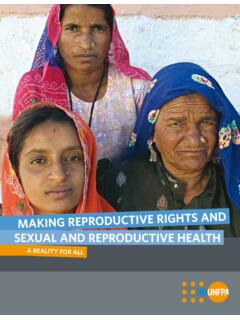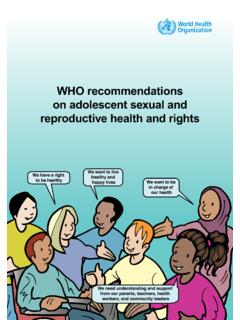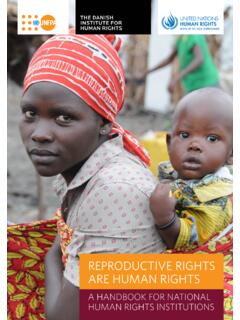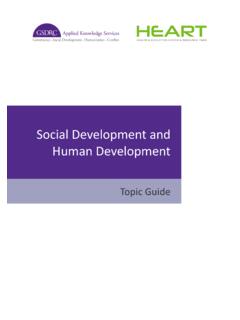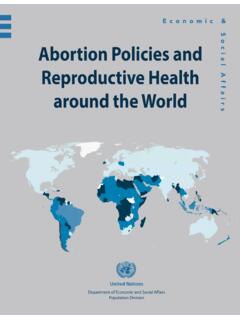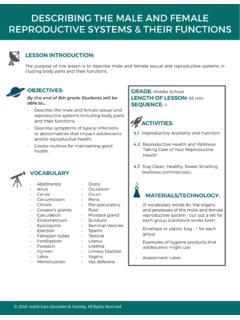Transcription of HUMAN RIGHTS AND OLDER PERSONS - sahrc.org.za
1 HUMAN RIGHTS AND OLDER PERSONS 1 HUMAN RIGHTS AND OLDER PERSONSHUMAN RIGHTS AND OLDER PERSONS 1 BACKGROUND The Constitution of the Republic of South Africa, 1996 is the supreme law of the country and it protects the RIGHTS of all people in South Africa. HUMAN RIGHTS are applicable to all people, by virtue of being HUMAN and everyone is born with these RIGHTS . Chapter 2 of the Constitution contains the 27 RIGHTS that are collectively called the Bill of RIGHTS and are inherent to all HUMAN beings, including OLDER PERSONS . The OLDER PERSONS Act 13 of 2006 provides that an OLDER person is a person who is 60 years old or South Africa OLDER PERSONS account for more than 8, 1% (4, 698 000) of the total population.
2 The country s cultural and economic landscape means that many OLDER PERSONS live in nuclear families although this trend is slowly changing as single unit families gain currency. Research reports indicate that the majority of OLDER PERSONS , approximately 76, 2% (3, 626 850) live below the lower bound poverty line and over 3,1 million are recipients of an old age grant. A small number of OLDER PERSONS are members of a medical aid scheme, leaving more than 70% dependent on the public health care system. Common health conditions in the elderly are high blood pressure at 45, 3%, diabetes at 15, 8% and arthritis at 13, 8%1.
3 1 Statistics South Africa, Social Profile of OLDER PERSONS Report, HUMAN RIGHTS AND OLDER PERSONSOLDER PERSONS AND HUMAN RIGHTSS outh Africa recognises that OLDER PERSONS are vital members of our society, and protects them in law through the OLDER PERSONS Act. The Constitution provides that everyone is equal before the law and has the right to equal protection and benefit of the law. Section 9 provides that no person (including the state and private companies) may unfairly discriminate directly or indirectly against any person on a number of listed grounds including race, gender, religion, social origin, and age.
4 The OLDER PERSONS Act gives effect to the RIGHTS in the Bill of RIGHTS in respect of OLDER PERSONS and aims to maintain and promote the status, wellbeing, safety and security of OLDER PERSONS . At the regional level, South Africa is party to international laws and agreements that commit the country to respect and protect the RIGHTS of OLDER persons2. 2 The African Charter of HUMAN and People s RIGHTS . In January 2016 the African Union adopted the Protocol to the African Charter on HUMAN and Peoples RIGHTS on the RIGHTS of OLDER PERSONS in Africa. Indications from government are that South Africa is likely to ratify the Protocol soon as the Protocol is in line with the OLDER PERSONS Act.
5 In 2010 the United Nations established the Open-Ended Working Group on Ageing and the process to develop a Convention dedicated to OLDER PERSONS is underway. This process seeks to build on other documents relating to OLDER PERSONS such as the Vienna International Plan of Action on Ageing, 1982; the UN Principles for OLDER PERSONS , 1991; the UN Proclamation on Ageing, 1992; and the Madrid International Plan of Action on Ageing, 2002. South Africa recognises that OLDER PERSONS are vital members of our society, and protects them in law through the OLDER PERSONS Act. HUMAN RIGHTS AND OLDER PERSONS 3 CHALLENGES FACED BY OLDER PERSONSD espite the law protecting OLDER PERSONS , they face a number of challenges as a vulnerable group with unique and differing needs.
6 In 2015, the South African HUMAN RIGHTS Commission (SAHRC/ Commission) in its report titled Investigative Hearing into Systemic Complaints Relating to the Treatment of OLDER PERSONS , identified systemic issues of concern that deny and deprive OLDER PERSONS the right to enjoy and realise their constitutionally guaranteed RIGHTS . Some of these include: The right to health careSection 27 of the Constitution provides that everyone has the right to have access to health care services, including reproductive health care. As people get OLDER , they become more vulnerable to several health conditions and as such they may need health care services more frequently than younger people.
7 In the course of its monitoring and investigation work, the Commission has noted that OLDER PERSONS , particularly those who live in rural areas and those who are poor and ill, are most adversely impacted when they try to access health care. These challenges are noted in the inadequate number of available emergency vehicles, cost of transport from rural areas to urban health facilities, long waiting queues at public health facilities and possibility of medicine shortages. These issues are compounded when OLDER PERSONS are treated with a lack of respect by health care professionals.
8 The treatment of OLDER PERSONS in the primary health care sector is an important factor beyond clinical treatment and there is a need recognised in the World Health Organisation (WHO) age-friendly Primary Health Care principles for the education and sensitisation of primary health care providers about specific needs of elderly clients. WHO recommends:4 HUMAN RIGHTS AND OLDER PERSONSa) Attitudes, education and training of health care providers be improved to promote assessment and treatment of conditions that afflict OLDER PERSONS and, to empower them to remain healthy; b) Primary health care management systems be adapted to the needs of OLDER PERSONS ; and.
9 C) Efforts to make physical access easier for OLDER PERSONS who have mobility, vision or hearing impairments be South Africa, many OLDER PERSONS take on the role of primary care givers to children, including where children are orphaned on account of tuberculosis and HIV/ AIDS. However OLDER PERSONS are not routinely included in routine HIV/AIDS screening or counselling in the public health care sector, nor are they made aware of how to manage chronic conditions. The SAHRC report highlighted concerns around education, sensitisation and training. The SAHRC probe revealed that staff in frail care facilities lack the necessary skills and capacity to assist OLDER PERSONS ; there is a shortage of equipment required to render proper assistance and that facilities with OLDER PERSONS were inadequately monitored, rendering OLDER PERSONS vulnerable to abuse as many are unaware of their RIGHTS .
10 The key government department responsible for monitoring and ensuring standards in such facilities are maintained has noted that low levels of RIGHTS awareness in OLDER PERSONS may have historical roots in South Africa on account of the fact that OLDER PERSONS from poor urban and rural backgrounds lacked the opportunity to attend school or dropped out at an early age3. 3 Department of Social Development : South African Policy on OLDER PERSONS , 2005 HUMAN RIGHTS AND OLDER PERSONS 5 The particulars of the convicted abuser will be entered into the National Register of OLDER PERSONS which is maintained by the Department of Social Development.
